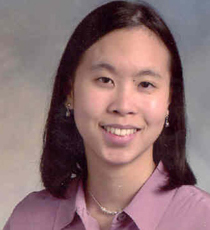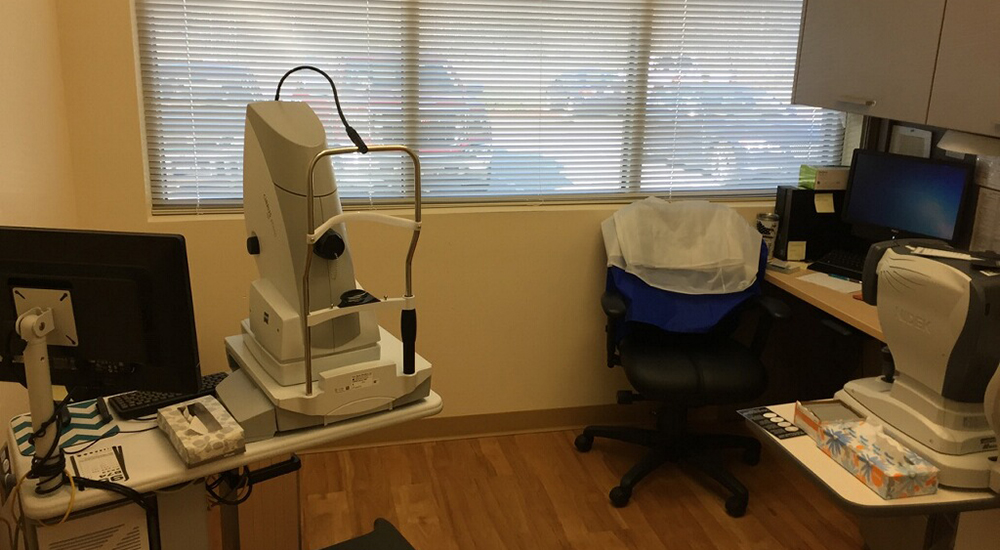Dr. April Maa is making screening for eye care much easier and more accessible for Veterans, especially Veterans living in rural areas.
Working with the Atlanta VA Eye Clinic, she developed an eye-screening program called Technology-based Eye Care Services (TECS).
Pictured above: A specialized camera (left) and machine to check vision and eyeglasses (right) help to provide screening eye care at a TECS site in Blairsville, GA.
TECS found possible vision-threatening disease in nearly one in three patients.
This is a valuable advancement because Veterans are at high risk for eye disease. Access to eye care is challenging within the VA network of hospitals and clinics because it is VA’s third busiest outpatient clinical service.
Rural veterans face many more barriers to accessing eye care because of distance, cost to travel, and difficulty finding care in the community as many live in medically underserved areas.
And rural Veterans may be diagnosed in later stages of eye disease more often than their non-rural counterparts due to lack of access to specialty care
Veterans are at higher risk of eye disease than the average U.S. person. The most common eye problems Veterans get are cataracts, glaucoma, macular degeneration and damage to the eyes from diabetes.
Streamlining the process
TECS is being used at VA facilities across the country.
After a Veteran makes an appointment, they go to their local Community-Based Outpatient Clinic where an eye technician performs the testing.
With specially trained ophthalmology technicians at the Veterans primary care clinic, TECS uses state of the art eye equipment to perform a high-quality screening eye exam.
The images are transmitted through the VA system to a doctor who reads images and prescribes the glasses which are mailed to the Veteran’s home from the optical contractor.
With TECS, VA can now use technology to help triage patients into levels of need (basic, intermediate, advanced), tailoring the patient care experience to the appropriate provider while optimizing resources.
TECS quality data showed that the program improved the ability of patients to get screening appointments and mitigated the distance traveled by Veterans and the time they spent trying to get eye care.

Maa is an Associate Professor at Emory University School of Medicine in the Department of Ophthalmology. She attended medical school at Baylor College of Medicine in Houston and joined Emory and the Atlanta VA in 2008 where she is a practicing clinician and clinical researcher.
Dr. Maa has received several accolades for her work in telemedicine at VA including the 2017 Mark Wolcott Award for Excellence in Clinical Care Leadership.
Topics in this story
More Stories
The 2024 National Veteran Suicide Prevention Annual Report provides the foundation for VA’s suicide prevention programs and initiatives.
Theranostics is a specialized field of nuclear medicine that uses a two-pronged approach to diagnose and treat cancer.
Air Force Veteran Shireta Jones overcomes obstacles with support from VA and adaptive devices to continue her passion for pickleball.








I work in the TECS program I find the patients are so grateful and happy to be seen in a timely manner. The discovery of an unknown glaucoma, the patient education of what we see and how they can better manage their known diseases (hypertension, diabetes) is a powerful tool for the primary care physicians as well. I have had primary care Docs tell me that the patient has become compliant for the first time once I have shown them a single blot and dot hemorrhage from looking at their picture i have taken. I truly believe TECS is a gift of sight for our Vets.
Thanks for the information. Eye care has always been important to me. I am so happy to see such vast improvements in VA care and they seem to be substantially leading edge. Thanks for the service you provide to all veterans and me.